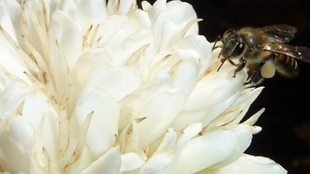 A honeybee visits a coffee flower.GERALDINE WRIGHTHoneybees may remember flowers better if they include a dose of caffeine in their nectar. The caffeine is acting pharmacologically in the bees’ brains to enhance memory formation, according to a study published in Science last week (March 7).
A honeybee visits a coffee flower.GERALDINE WRIGHTHoneybees may remember flowers better if they include a dose of caffeine in their nectar. The caffeine is acting pharmacologically in the bees’ brains to enhance memory formation, according to a study published in Science last week (March 7).
“We show that caffeine—a compound whose ecological role is mainly to deter and poison herbivores—actually acts like a drug in an ecologically relevant context,” Geraldine Wright, a neuroscientist at Newcastle University and lead author of the study, told National Geographic. “The plant is secretly drugging the pollinator. ”
The researchers selected three species of coffee plants and three citrus species (grapefruit, pomelo, and mandarin orange)—plants known to be caffeine-producers—and tested them to see if their nectar was caffeinated. They found that, indeed, the nectar consistently had small amounts of caffeine.
To test bees’ response to caffeine, the researchers did a classical conditioning experiment, giving the insects nectar with various caffeine concentrations while exposing them to a floral scent. When they reintroduced the floral scent up ...




















